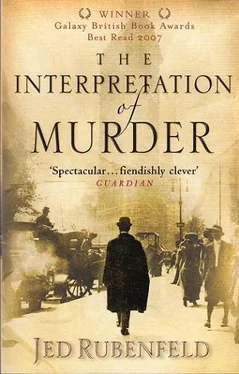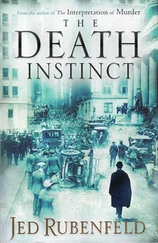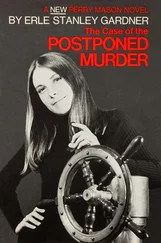Jed Rubenfeld - The Interpretation of Murder
Здесь есть возможность читать онлайн «Jed Rubenfeld - The Interpretation of Murder» весь текст электронной книги совершенно бесплатно (целиком полную версию без сокращений). В некоторых случаях можно слушать аудио, скачать через торрент в формате fb2 и присутствует краткое содержание. Жанр: Исторические приключения, на английском языке. Описание произведения, (предисловие) а так же отзывы посетителей доступны на портале библиотеки ЛибКат.
- Название:The Interpretation of Murder
- Автор:
- Жанр:
- Год:неизвестен
- ISBN:нет данных
- Рейтинг книги:5 / 5. Голосов: 1
-
Избранное:Добавить в избранное
- Отзывы:
-
Ваша оценка:
- 100
- 1
- 2
- 3
- 4
- 5
The Interpretation of Murder: краткое содержание, описание и аннотация
Предлагаем к чтению аннотацию, описание, краткое содержание или предисловие (зависит от того, что написал сам автор книги «The Interpretation of Murder»). Если вы не нашли необходимую информацию о книге — напишите в комментариях, мы постараемся отыскать её.
The Interpretation of Murder — читать онлайн бесплатно полную книгу (весь текст) целиком
Ниже представлен текст книги, разбитый по страницам. Система сохранения места последней прочитанной страницы, позволяет с удобством читать онлайн бесплатно книгу «The Interpretation of Murder», без необходимости каждый раз заново искать на чём Вы остановились. Поставьте закладку, и сможете в любой момент перейти на страницу, на которой закончили чтение.
Интервал:
Закладка:
'Thank heavens I moved her into the hotel,' said McClellan.
'Does anyone else know where she is?'
'The doctors, of course.'
'Did you tell any friends of the family?' asked Hugel.
'Certainly not,' said McClellan.
'Good. Then she is safe for now. Has she remembered anything today?'
'I don't know,' said McClellan gravely. 'I haven't been able to get through to Dr Younger.' The mayor considered his options. He wished he could have called up old General Bingham, his longtime police commissioner, but McClellan had pushed Bingham into retirement only last month. Bingham had refused to reform the police, but he was himself incorruptible and would have known what to do. The mayor also wished Baker, the new commissioner, had not already proved so inept. Baker's only subject of conversation was baseball and how much money could be made in it. Hugel, the mayor reflected, was one of the most experienced men on the force. No: in homicides, he was the most experienced. If he didn't consider a warning necessary, he was probably right. The papers would certainly make hay of it, sowing as much hysteria as they possibly could and heaping scorn on the mayor as soon as they learned, as they certainly would, of the loss of the first victim's body. Then too, McClellan had assured Banwell that the police would try to solve the case without publicity. George Banwell was one of the few friends the mayor had left. The mayor decided to follow Hugel's advice.
'Very well,' said McClellan. 'No warning for now. You had better be right, Mr Hugel. Find me the man. Go to Acton's at once; you will supervise the investigation there.
And tell Littlemore I want to see him immediately.'
Hugel protested. Cleaning his spectacles, he reminded the mayor that it was no part of a coroner's duties to gallivant up and down the city like an ordinary detective. McClellan swallowed his irritation. He assured the coroner that only he could be trusted with a case of such delicacy and importance, that his eyes were famously the sharpest on the force. Hugel, blinking in a way that appeared to express perfect agreement with these assertions, consented to go to the Actons'.
Directly Hugel left his office, McClellan summoned his secretary. 'Ring George Banwell,' he instructed her. The secretary informed the mayor that Mr Banwell had been calling all morning. 'What did he want?' asked the mayor.
'He was rather blunt, Your Honor,' she replied.
'It's all right, Mrs Neville. What did he want?'
Mrs Neville read from her shorthand notes. 'To know "who the devil murdered the Riverford girl, what was taking the blasted coroner so long to finish the autopsy, and where his money was.'"
The mayor sighed deeply. 'Who, what, and where. He's only missing when.' McClellan looked at his watch. The when was running short for him as well. In two weeks at most, the candidates for mayor had to be announced. He had no hope of the Tammany nomination now. His only chance was as an independent or fusion candidate, but that kind of campaign required money. It also required good press, not news of a spree of unsolved attacks on society girls. 'Ring Banwell back,' he added to Mrs Neville. 'Leave word for him to meet me in an hour and a half at the Hotel Manhattan. He won't object; he has a job near there he'll want a look at in any event. And get me Littlemore.'
A half hour later, the detective introduced his head into the mayor's office. 'You wanted to see me, Your Honor?'
'Mr Littlemore,' said the mayor, 'you are aware we have had another attack?'
'Yes, sir. Mr Hugel told me, sir.'
'Good. This case is of special importance to me, Detective. I know Acton, and George Banwell is an old friend of mine. I want to be kept abreast of every development. And I want the utmost discretion. Go to the Hotel Manhattan on the double. Find Dr Younger and see if any progress has been made. If there is any new information, call here at once. And Detective, make yourself inconspicuous. Word must not get out that we have a potential murder witness at the hotel. The girl's life may depend on it. Do you understand?'
'Yes, sir, Mr Mayor,' Littlemore replied. 'Do I report to you, sir, or to Captain Carey at Homicide?'
'You will report to Mr Hugel,' said the mayor, 'and to me. I need this case solved, Littlemore. At any price. You have the coroner's description of the killer?'
'Yes, sir.' Littlemore hesitated. 'Um, one question, sir? What if the coroner's description of the killer is wrong?'
'Do you have reason to think it wrong?'
'I think — ' said Littlemore. 'I think a Chinaman might be involved.'
'A Chinaman?' the mayor repeated. 'Have you told Mr Hugel?'
'He doesn't agree, sir.'
'I see. Well, I would advise you to trust Mr Hugel. I know he is — sensitive — on some points, Detective, but you must bear in mind how hard it is for an honest man to do his work in relative obscurity, while dishonest men attain wealth and renown. That is why corruption is so pernicious. It breaks the will of good men. Hugel is extremely capable. And he thinks highly of you, Detective. He asked specifically that you be assigned to this case.'
'He did, sir?'
'He did. Now get going, Mr Littlemore.'
I was leaving the hotel when I ran into the girl and her servant, Mrs Biggs, about to do their shopping. A cab was just pulling up for them. Because the street bed, rutted with dirt and dry mud, was unfit, I lifted Miss Acton into the carriage. As I did, I noticed uncomfortably that her tiny waist almost fit into my two hands. I sought to assist Mrs Biggs as well, but the good woman would have none of it.
To Miss Acton, I said I looked forward to seeing her tomorrow morning. She asked what I meant. I was referring, I explained, to her next psychoanalytic session. My hand was resting on the open door of her cab; she yanked the door shut, dislodging me. 'I don't know what is wrong with all of you,' she said. 'I don't want any more of your sessions. I will remember everything by myself. Just leave me alone.'
The cab drove off. It is hard to describe my feelings as I watched it rattle away. Disappointed would not quite be adequate. I wished my too-solid body might break up and disperse into the dirt of the street. Brill should have been the analyst. A medical journeyman, a town general practitioner, would have been better, so abysmally had I imitated a psychoanalyst.
I had failed before even beginning. The girl had rejected analysis, and I had been unable to change her mind. No: I had caused the rejection, pressing too hard before the groundwork had been laid. The truth was that I had been unprepared to find she could speak. I had forgotten Freud's own speculation that she might recover her voice overnight. Her voice ought to have been a boon to the treatment, the luckiest possible development. Instead, it disrupted me. I had pictured myself as the patient and infinitely accommodating doctor. Instead, I had dealt with her resistance defensively, like a blundering amateur.
What would I say to Freud?
Entering the Hotel Manhattan, Detective Littlemore passed a young gentleman helping a young lady into a cab. The two figures represented, for Littlemore, a world to which he had no access. They were both easy on the eyes, decked out in the kind of finery that only the better set could afford. The young gentleman was tall, dark-haired, and cheekbony, the young lady more like an angel than Littlemore thought possible on earth. And the gentleman had a way of moving, a fluidity when he swung the young lady into the carriage, that Littlemore knew he himself did not possess.
None of this bothered the detective in the least. He did not resent the young gentleman, and he liked Betty, the maid, better than he liked the angelic young lady. But he decided he was going to learn to move the way the gentleman did. That was something he could figure out and copy. He pictured himself hoisting Betty into a cab just like that — if he ever got to take a cab, much less take one with Betty.
Читать дальшеИнтервал:
Закладка:
Похожие книги на «The Interpretation of Murder»
Представляем Вашему вниманию похожие книги на «The Interpretation of Murder» списком для выбора. Мы отобрали схожую по названию и смыслу литературу в надежде предоставить читателям больше вариантов отыскать новые, интересные, ещё непрочитанные произведения.
Обсуждение, отзывы о книге «The Interpretation of Murder» и просто собственные мнения читателей. Оставьте ваши комментарии, напишите, что Вы думаете о произведении, его смысле или главных героях. Укажите что конкретно понравилось, а что нет, и почему Вы так считаете.












